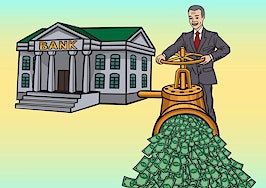Mortgage applications fell to their lowest level in more than 12 years last week as interest rates increased in advance of the Federal Open Market Committee Meeting that began on Dec. 17 and ends today, the Mortgage Bankers Association (MBA) reported.
Applications for purchase loans during the week ending Dec. 13 were down a seasonally adjusted 6 percent from the week before and 12 percent from the same time a year ago, to the lowest level since December 2012. Requests to refinance were down 4 percent from the previous week, continuing their long downward trajectory.
During the housing downturn and recovery, the Fed’s purchases of Treasurys and mortgage-backed securities helped push mortgage rates to record lows. While mortgage rates are still low by historical standards, many homeowners who were eligible to refinance have already done so.
Trulia Chief Economist Jed Kolko tweeted that increased mortgage rates — which jumped in the spring after the Fed signaled it was preparing to dial back its stimulus program — have “whacked” refinance applications, and the housing recovery has been too weak to fill the gap with purchase loans.
Joel Lobb, a senior loan officer at Louisville, Ky.-based American Mortgage Solutions, said that in all his 18 years as a loan officer he’s never seen it this slow.
“Refinances are pretty much not existent in the loan pipeline anymore, with a lot of mortgage refi shops closing,” Lobb said.
But purchase loan demand has dried up, too, he said. After hitting a three-year peak in early May, purchase loan applications have dropped by 21 percent, according to MBA data.
In addition to elevated interest rates, Lobb said fewer people are seeking to purchase homes with mortgages or refinance because the Federal Housing Administration (FHA) has both increased the mortgage insurance premiums that it charges borrowers and tightened its underwriting requirements.
“Once you figure those premiums in, it is very costly to refinance or buy a home,” Lobb said of FHA insurance premiums. “The private mortgage insurance market is supposed to supplement the government-insured mortgage market, but it is still very restrictive with higher credit scores requirements usually being at least 660 or higher.”
At the Fed committee meeting, officials are discussing when to begin tapering the central bank’s stimulus program, which has helped keep interest rates low in recent years. Some analysts expect the Fed to begin winding down the program as early as this month, a move that could spark erratic activity across financial markets and potentially drive up interest rates.
Market activity in recent months has illustrated investors’ sharp sensitivity to the status of the stimulus program. Mere anticipation of a Fed pullback has helped push up 30-year fixed-rate mortgage rates by around 1 percentage point since the spring.



